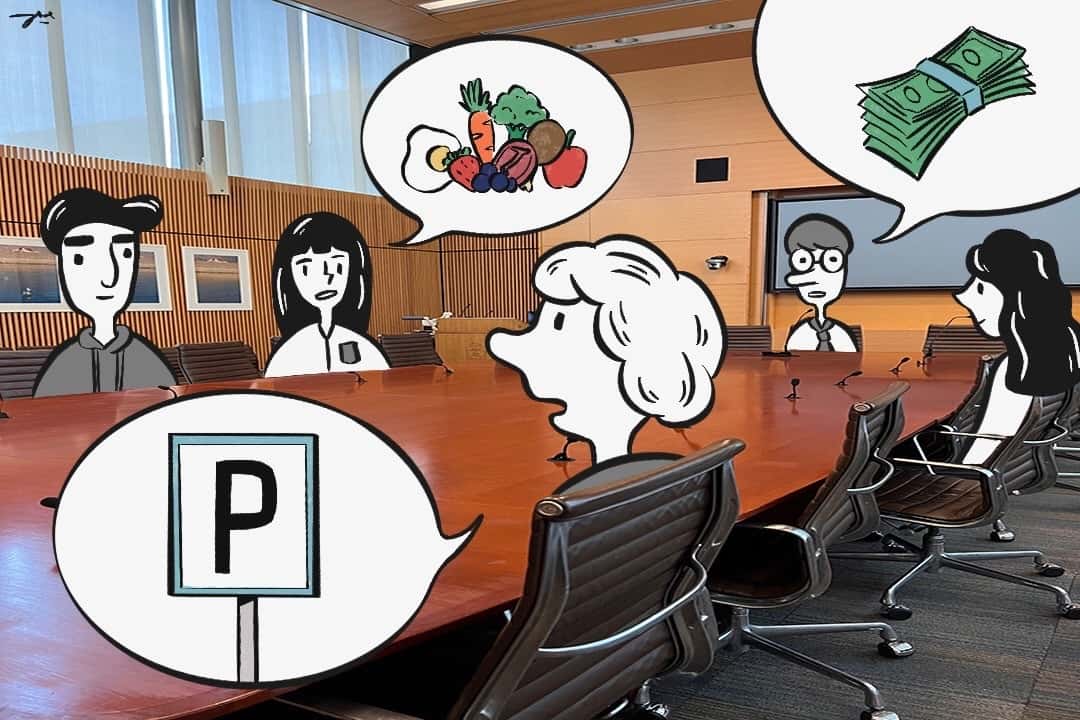The January 24 UTM Campus Council meeting included votes on many changes to the fees students will face next year, including a 6.5 per cent increase in rates for students living in residence and a three per cent increase in meal plans and parking fares. It also provided a snapshot of the financial challenges facing UTM institutions such as Hospitality Services and Student Housing & Residence Life (SHRL).
Rising residence receipts
At the meeting, Brian Cunha, the director of SHRL, presented proposed changes to the cost students pay to live in residence.
Cunha noted that UTM expects more students to demand on-campus housing in the coming years due to the limited availability of off-campus housing, rising UTM enrolment, and a rising preference for on-campus residences. Cunha told the council that, given the rising demand, he “anticipate[s] [they] could fall short of meeting [U of T’s] guarantee” to provide on-campus housing to all first years who request it.
The council approved increasing undergraduate residence rates at UTM by 6.5 per cent, while rates for graduate, medicine, and family residences will see an increase of three per cent. The Student Housing Advisory Committee approved these changes.
Cunha also told members about renovations that the MaGrath Valley Residence will undergo during the 2024–2025 academic year. The university plans to undertake a project to improve the MaGrath Valley through renovations — including new doors, windows, roofs, floors, kitchens, bathrooms, and furniture — and landscaping.
Making up losses and food price increases
UTM’s Hospitality Services — which includes food and facility rentals — faced challenges amid fluctuating food prices and unexpected transitions, including a mid-year change in food service providers. Additionally, the writer and actor strikes in the US that ended in September and November 2023, respectively, decreased the income that U of T received from camera crews renting out campus spaces. As such, Hospitality Services expects a loss of $730,000 between May 1, 2023 and April 30, 2024.
To account for inflation, the council approved plans to increase the average cash price of food at non-chain restaurants on campus by 3.3 per cent. The price of meal plans will increase by three per cent on average.
Looking ahead, the department hopes to potentially alleviate its financial strains by increasing its income from people renting UTM facilities. With the actor and writer strikes ended, the university hopes to see increased revenue flowing in from movie shoot rentals.
Parking services
The university expects parking at UTM to face a deficit for the next two years, with a positive turn expected in the 2025–2026 fiscal year.
Noteworthy initiatives over the past year have included the License Plate Recognition (LPR) program, which the university implemented in September. This program simplifies access to campus by allowing people to pay online, which streamlines parking procedures for visitors. Additionally, the university has adopted new pay-by-plate options — where people can input their plate numbers into a machine without needing to receive a ticket — in all of its parking machines. Testing for a pay-by-app feature — where people can top up their parking from anywhere — is in its final stages.
UTM has also enhanced its parking infrastructure: it has doubled the number of its Electric Vehicle (EV) charging stations to a total of 12, catering to the increasing demand for eco-friendly transportation options.
The council approved a proposed three per cent across-the-board increase for parking fees, coupled with the decision to maintain existing pay-and-display rates.
Student responses
In an interview with The Varsity, Ehab James — student governor on the UTM campus council — highlighted the financial challenges students are facing as Ontario universities scramble to make up revenue. He pointed out how strikes, funding reconsiderations, and the recently announced cap on international student permits will all further impact the university’s budget.
James abstained from the votes on fee increases held during the meeting. He urged the University of Toronto Mississauga Students’ Union (UTMSU) to advocate for student interests by calling on the Minister of Colleges and Universities to better support universities amid the current cost of living crisis.
“It really is up to the [UTMSU] now to do what is right and take critical action to make sure that the students who are most vulnerable and impacted by these changes are still able to attend university, are still able to put food on the table, still able to park if they need to, and still be able to be housed here,” James said in an interview with The Varsity. “Education is a right, it’s not a privilege, and it’s increasingly becoming more of a privilege.”
Jan Durkiewicz, a student representative on the UTM campus affairs committee, posted a video to his Instagram where he highlighted the university’s proposal to increase food fees by 3.3 per cent and residents’ meal plans by 3.4 per cent, starting next September. He expressed opposition to these increases, emphasizing the negative impact on student affordability.
“The students cannot handle more inflation,” Durkiewicz stated in the video.
In an interview with The Varsity, Durkiewicz expressed concerns over proposed food price increases at UTM. He argued against imposing additional costs on students, especially with potential tuition and fee hikes. In a January 31 press conference, Ontario Premier Doug Ford said that he doesn’t “believe this is a time” to increase tuition, but his staff clarified that the provincial government is still considering a tuition increase as an option.
Durkiewicz highlighted the university’s annual food feedback survey, which will be released in the coming few months, as a way for students to express their input.



No comments to display.